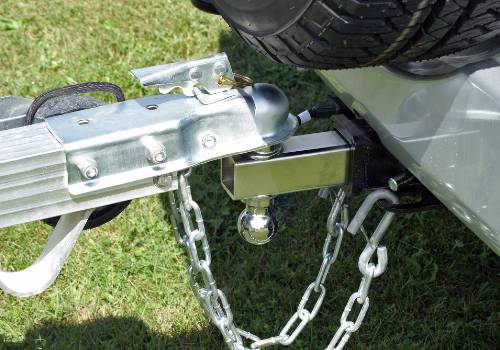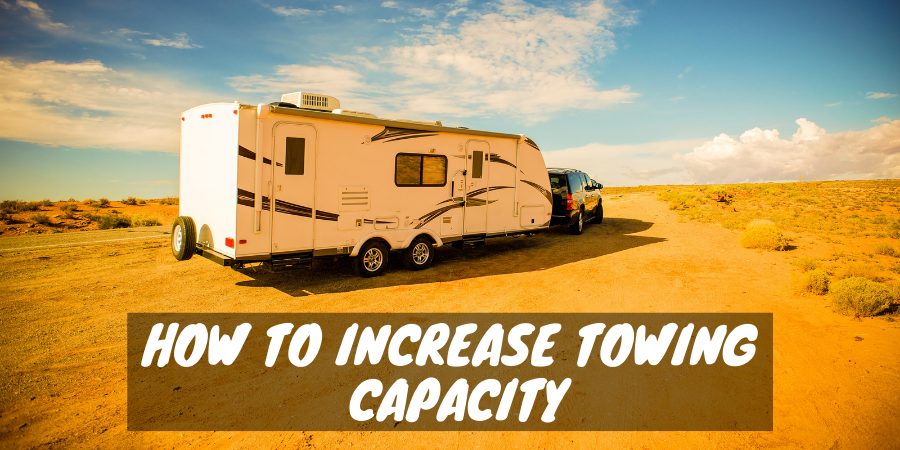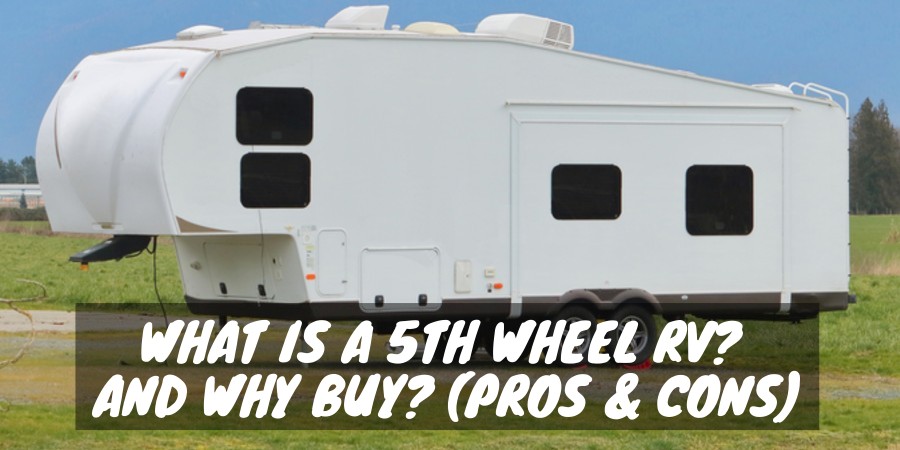Is it possible to safely increase towing capacity?
The answer is yes, but there are many things you need to take into consideration so you can do it the right way.
Pulling loaded trailers or RVs with a truck is very common, so knowing how to boost towing performance can help you avoid upgrading to the next larger vehicle.
Everyone wants to save time, hassle, and money, so let’s begin!
Why You Need to Increase Towing Capacity of a Truck or SUV

There are two reasons people look to increase towing capabilities on their vehicles.
The first reason is to amp up the towing capacity or weight the vehicle can pull. The second reason is to help with the overall performance of both the vehicle and the tow during travel.
There is debate, especially within the RVing community, about whether you should attempt to alter your vehicle to increase towing capacity or get a larger or newer vehicle with better towing power.
The answer depends on how much and how often you need to increase the towing capacity.
Say you own a 2015 Chevy Silverado 1500 4×4 truck with a 4.3L V-6 engine, 6.5-foot box, and 3.42 axle and usually pull a trailer with construction supplies.
The 7,600-pound maximum towing capacity should easily handle most loads.
Now, if you take that same truck and decide to hook up your 34-foot travel trailer, you will have a problem. The average weight of a 34-foot pull-behind camper is 8,000 pounds.
You may think a few hundred extra pounds is safe to tow, but did you forget about what the camper will weigh after you pack it for your trip?
After adding in fresh, a generator, camping supplies, clothing, and food, the camper’s actual weight will increase at a minimum of another 1000 pounds. In reality, most people overload their trailers so that the real number will be closer to 1500 pounds.
The final number pushes your towing limits way over your truck’s rating, and no amount of alterations to your tow vehicle will make it safe to take on the road.
The handling of your tow vehicle is the real reason people upgrade components to increase towing capacity.
So, what changes can you make to a truck or SUV to handle towing conditions better?
You must upgrade these parts:
- Programmer
- Suspension
- Radiator
- Axle
- Exhaust
- Hitch
- Brakes
- Chassis
As you can see, the amount of work to alter your tow vehicle to safely increase towing capacity can be more than you and your wallet wish to tackle.
Benefits of Towing Capacity Modifications
Expect these benefits from modifications to increase truck or SUV towing capacity:
- More stability while driving
- Better balance of weight on axles
- More traction pulling from a stop
- Better braking distances
- Less wear on vehicle suspension and engine parts
For those who can’t afford a newer or more powerful vehicle and only need a small increase in towing capacity, modifications can greatly improve performance, which I explain in detail down below.
The Facts About Increasing Towing Capacity

Before you ever tow a camper or trailer, you need to understand what all the different numbers mean.
The manufacturer sets the maximum tow rating of a vehicle, and the SAE (Society of Automotive Engineers) J2807 standard lists all the current model trucks and SUVs.
Maximum tow rating formulations are reliant on the vehicle’s build so it can safely pull, brake, and drive under full-load conditions.
Here is a quick explanation of common towing terms:
- GVWR (Gross Vehicle Weight Rating) – The maximum weight limit of a vehicle or trailer set by the manufacturer that includes payload and passengers and payload
- GCWR (Gross Combination Weight Rating) – The maximum weight of the tow vehicle and trailer and tow vehicle combination
- GVW (Gross Vehicle Weight) – The real weight of a vehicle with cargo, passengers, and equipment
- GTW (Gross Trailer Weight) – How much a fully-loaded trailer weighs
- GAW (Gross Axle Weight) – The real weight applied on each axle
- GAWR (Gross Axle Weight Rating) – The maximum weight that is safe to place on an individual axle
Remember that weight ratings are set by the manufacturer, and exceeding them is risky.
While modifications can increase towing capacity, you can’t legally alter any vehicle’s maximum tow rating.
What does that mean? By law, the tow rating is set, and you cannot change them on your vehicle’s paperwork to update them for the modifications you make.
Let’s say you modify your truck’s capacity, and you drive for years, towing 400 extra pounds with no issues.
One day, you get into an accident while towing, and they determine you are pulling excess weight.
Guess what? You may receive a hefty fine or be liable for damages.
Even using the wrong type of hitch for towing can cause tickets or lawsuits for improperly equipping a tow vehicle.
Will Increasing Towing Capacity Affect My Vehicle Warranty?
If wear and tear to your vehicle’s components are from towing excess weight, most manufacturers will not honor your warranty.
Drivetrain or suspension system repairs can be costly, so keep this in mind when modifying your truck or SUV to increase towing, as it may all fall on you to foot the bill.
How To Increase Towing Capacity

For those of you interested in what it entails to increase the towing capacity of a truck or SUV, here are the modifications you will need to make.
Not every vehicle will need every modification, but the more you can balance the towing stresses on your truck or SUV, the better performance you should expect.
Programmer
A vehicle has a programmer that tells the computer how much horsepower and torque the engine should generate.
Changing the programmer can allow you to add higher settings for the air-to-fuel ratio, alter the way the transmission shifts, and make other technical modifications.
Since manufacturers set programmers to achieve better fuel economy, you can adjust them for more horsepower instead. Do expect lower MPG as the trade-off.
Suspension
Towing a trailer or camper puts weight on your vehicle’s back end, which pushes it down, causing stress on the tires, back axle, and suspension system.
Installing heavy-duty parts creates a smoother ride and better steering control, relieves the burden on vehicle parts, and distributes the trailer’s weight more evenly across both axles.
Most people opt for durable leaf springs or coil springs that can handle extreme stresses. Coil-over shock absorbers are another way to modify your vehicle to help out your rear suspension.
SuperSprings is a significant upgrade that helps reduce trailer sway tremendously by balancing out the stress put on leaf springs.
Other people may opt for an air suspension system that uses air bladders to absorb excess weight and shock of bumps while driving.
Less bouncing around while towing a trailer increases the vehicle’s overall control, making it a safer and more comfortable ride for you.
Radiator and Fluids
Upgrading to a bigger radiator will help offset the heat and stress of towing a heavier weight.
Trucks and SUVs that come with a tow package have two radiators to handle cooling for the engine and the transmission. Going with a larger radiator system will cool components faster.
Also, switch to better lubricant types for your transmission fluid and engine oil. Look for brands that offer the best heat diffusion.
Axle
Switching your axles and differential to heavy-duty versions adds strength when you are trying to increase towing capacity.
A good tip is to look at RV motorhome parts that can withstand the extra weight stress, as most will fit onto trucks with no issues. Use an expert mechanic to install these parts, as special tools and experience are crucial for proper installation and function.
Exhaust
Want to Connect With a Community of Over 1,078 RV Enthusiasts?
Upgrading the exhaust system brings more air in and out, which lets the engine perform to a higher standard.
A better air intake system and dual exhaust increase torque and horsepower. Installing top-quality air filters will also improve performance.
Hitch

What hitch you put on your tow vehicle is critical when trying to increase towing capacity.
You’ll need to upgrade to a Class IV hitch if you need to handle up to 10,000 pounds of towing.
A Class III hitch has a 5,000-pound rating, but if you’re hauling a smaller trailer, this may also work for your needs.
The strength of your chassis (more on this below) must be able to take the pressure of a Class IV hitch where it attaches to the receiver.
Fifth-wheel hitches attach inside the bed of a truck and handle more towing weight because the distribution is farther forward and centered between the truck’s front and rear axles. But, if your hitch isn’t rated for a heavier load, you must upgrade it accordingly.
For towing travel trailers, consider the highly-rated SuperHitch Everest weight distribution system that distributes tongue weight evenly (1/3rd each) over the trailer axle and the front and back axles of your truck.
Perfect balance alleviates problems such as sags, poor stability, and loss of control when making quick driving maneuvers.
Brakes
You must modify your braking system if you want to increase towing capacity.
The more weight you tow, the harder it is on your brakes and the longer it will take to stop safely.
Electronic brake control systems are a great way to help with safe braking, as they automatically sense which brake needs additional pressure and apply it. These systems allow your brakes to work better and reduce overall wear on all your brake components.
A trailer brake control system is also a must when boosting towing capacity. Without it, the tow vehicle must endure the brunt of both the truck and the trailer’s braking weight.
A trailer braking system automatically controls the stopping of the tires, so your trailer slows itself. Trailer braking also helps increase friction, so your tow vehicle’s brakes don’t have to work as hard.
You will also need to upgrade to higher heat and stress-resistant rotors and brake pads to deal with the additional stress. The heavier the weight, the longer it will take to come to a complete stop.
Chassis
Your vehicle’s chassis may need some reinforcement when increasing towing performance.
A body-on-frame style is much easier to work with over unibody framing as they are more rigid in construction and can handle more weight stress.
A trained mechanic can identify ways to reinforce your chassis to hold up to the strain extra towing capacity will cause. Don’t try to guess or DIY this part yourself, as failure could be catastrophic.
Final Thoughts
It would be best to take care when you increase the towing weight of your SUV or truck to avoid accidents or damage to your vehicle.
When you compare what it costs to make modifications to upgrade towing power, you may find it more suitable to trade in your current vehicle for one with a higher towing capacity.
I hope you use the helpful information above on how to increase towing capacity to ensure you’re doing all that you can to stay safe while driving and pulling a trailer or camper.
Staying safe while traveling on the road is always the smart choice!
How Much Can You Tow? (Video)
"Man cannot discover new oceans unless he has the courage to lose sight of the shore."
-- Andre Gide











